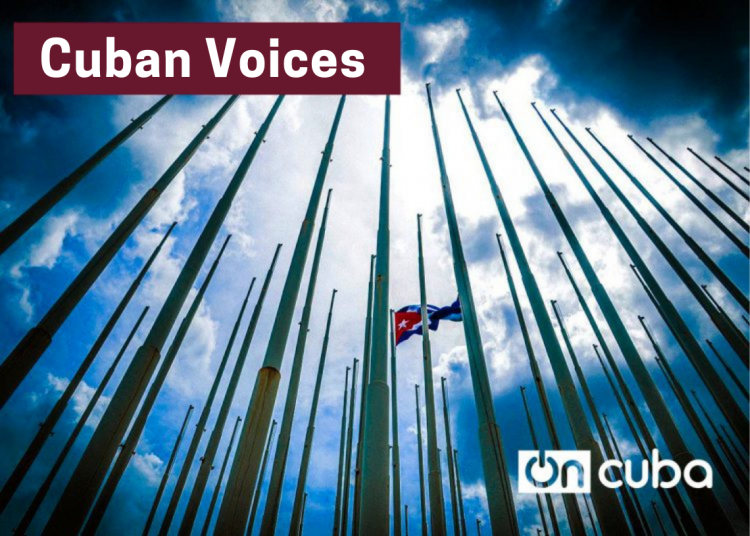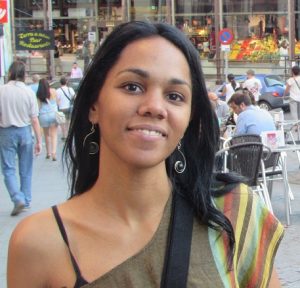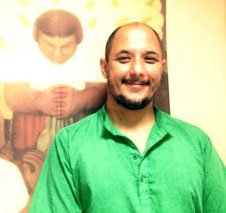The series Cuban Voices, which we inaugurate with an interview with the film director Ernesto Daranas, incorporates other intellectuals into the discussion in search of answers and much-needed horizons for the present and future of Cuba. The destiny of the homeland is a concern shared by all Cubans, without exclusive and monopolistic fields being justified for its fate. True to this premise, the series will try to add people from various sectors (not only the intellectual) to the debate and thus build a space for reflection, analysis and feelings about Cuban public affairs and about the nation in general. On this occasion, we went to look for the voices of other intellectuals who have stood out in the Cuban social and cultural environment. They are the lawyer, researcher, feminist and anti-racist activist Alina Herrera Fuentes and the political scientist and popular educator Ariel Dacal.
For some time, Cuban society has been transforming socially and economically, and demands of various kinds are seen by various sectors of society. Is Cuban design in tension to absorb and manage these demands?
Alina Herrera Fuentes: This question is very wide-ranging. However, referring to design forces me to start with the Constitution of the Republic, which meant great advances in the recognition of human rights, for example, and that prompted the need to approve a new legal system. One of the novelties of the text in relation to constitutional rights is the possibility for citizens to claim them before the courts, that is, through legal means. However, the approval of this new Claim Law was inexplicably postponed to December 2021, violating the Law of laws that had established it for October 2020. By this I mean that, no matter how much the design shows the purpose and the ability to manage social demands, and although it has been approved by the vast majority of Cuban citizens, the execution of this design presents large gaps with the written letter and approved in a referendum.
The same occurs with the constitutional recognition of the expansion of instruments of direct democracy (the initiative of constitutional reform, the plebiscite, the referendum, the initiative of law, the revocation of mandate) and with the recognition of the right to participate in the formation, exercise and control of the power of the State as a basis for direct participation. They are advances in the constitutional design, however, the text itself does not guarantee that the legal assumptions can be carried out. Therefore, this recognition is not enough; it is essential that the institutions want and are able to circumvent citizen demands, that mechanisms are created to access public political power, that citizens can influence the different levels of decision-making and that the state apparatus can receive feedback from the interests and needs of its citizens. It is a requirement to speak of the ability to manage plural demands.
Centralization in decision-making, political shielding in the solution of conflicts of public interest, the bureaucratization of institutions are problems entrenched in the design, which hinder the usefulness of laws when they favor the citizenry, nullify the possibility of horizontalizing the powers and obligations of institutional political actors with civil society.
Right at this critical stage of socio-economic changes and reorganization of the legal system, it is important to deepen the democratization of the country’s institutions, of government work. The horizontality of the discussion of these changes is essential, the approach to citizenship, the permanent dialogue with civil society, especially when the Constitution so mandates it. The spirit of socialist design or democratic socialism is that, and it is one of the great challenges of the revolutionary project.
Ariel Dacal: A first piece of information to describe the Cuban reality is the coexistence of old and new ways of doing politics. This reality has an impact on institutional design, decision-making mechanisms and the emergence of new actors on the political scene. With more or less clear manifestations, with more or less established spaces, with diverse interpretations and proposals, the truth is that, and this is a second important fact, the political plurality on the island is an irrefutable fact.
I add a third piece of information, and that is that many of the demands known today came to the fore in the process of public debate that accompanied the beginning of the reforms, which opened the national agenda with extensive themes and approaches. The fourth piece of information is that government mechanisms have been set up to collect and process opinions from different social sectors, as well as to provide information on various issues.
My interpretation of these facts is that there is an imbalance between the government’s political willingness to open important issues and expand access to information, and the ability to channel the creation of public policies. Even further, to enable institutional mechanisms that guarantee greater social participation in channeling solutions.
Among the pending issues is the creation of stable, institutionalized and efficient means of dialogue between the government and civil society. This entails broadening the understanding of what Cuban civil society is, specifically its socialist character.
On the other hand, it is worth noting that the so-called social demands, in a class scenario, where different paradigms of society are disputed, where agendas can be contrary to each other, place a specific tension on government work as a mediator between socio-political differences.
Still pending is the establishment of legal frameworks that specify access to a group of citizen rights enshrined in the Constitution, endorsed in 2019, which could channel solutions, in a better way, for the various social demands.
There is a close relationship between institutional design and the political culture that supports it. I prefer then to speak of potentialities to channel social demands, which requires, in the first order, to consolidate, in practice, a political culture based on consensus and dialogue for the collective creation of public policies that satisfy them.
In the Cuban context, what do you think would be the role of the intellectual in today’s Cuba? Is there a need for critical discourses in our society?
Alina Herrera Fuentes: I’m thinking of Gramsci, Marcuse and the role of intellectuals, that is why I believe that the work of intellectuals is intrinsically political. They manifest the social and political tensions of a historical moment and, in turn, in that expression, act as mediators between the political class and civil society. They articulate a spoken language between the people and the state apparatus, above all because they have the means and channels to do so. The same thing happens in today’s Cuba, the work of Cuban intellectuals expresses the life of the people and at the same time, they socialize knowledge. One of the cornerstones to produce consensus is culture, education and knowledge. In Cuba, intellectuals are not an independent or isolated class of the people, they are part of it, of society, as citizens in the exercise of their work/works as well as in the exercise of their rights, as a driving force for the nation’s changes, catalysts of persuasion processes and social transformations, with the same interests as the rest of society. They are also producers of a critical counter-hegemony, whose wealth should feed the institutional agents for the benefit and at the service of the people, which is the great sovereign.
In addition to critical discourses, receiving agents are needed who respond with a commitment to their citizens. Critical positions and analyzes already exist and they are not few, nor are they per se “counterrevolutionary.” Certainly, on the government side, we long for more critical, transparent positions and effective solutions to the problems we have as a nation and as a society.
Ariel Dacal: The social function of intellectual work is the production, systematization, resignification and projection of ideas about reality. It concerns, fundamentally, the field of thought and reflection.
It is understood that those who do it belong to a social group that, in some way, tries to educate the population, propose debates, explain certain phenomena and elaborate alternatives. Therefore, they acquire, as a moral duty, the urging of a critical reflection on reality.
Intellectual activity is mediated, like all human activity, by diverse historical, socio-class, political and cultural contexts. Intellectual exercise is anything but neutral to social phenomena. Intellectual are generated in the very reality that they interpret. Intellectual work involves, with greater or lesser awareness, the production or reproduction of ideas that support the interests of specific groups and social classes. It is the Gramscian idea of the organic intellectual.
Being an intellectual in Cuba today does not escape any of these details. With a more or less public scope, the production of ideas and reflections on Cuban social reality is broad, diverse, rich, deep and, we must underline it, with diverse ideological signs. Said in Gramscian terms, there are organic intellectuals for the different groups, sectors, or classes, emissaries of the different social paradigms that are currently in dispute.
In this context, the production of positions must be consolidated with rigor, decency, dialogue and counterpoints based on the elaboration and dissemination of ideas, on collective reflection, in the search for the common good. It is a duty to avoid disqualifications, fallacies, the criminalization of the different as “intellectual” methods.
In the current context, critical thinking assumed as an understanding of reality, the historicity of social, political and economic phenomena, the subjects involved, the interests in dispute and the range of alternatives to transform reality, must be stimulated in a special way. Critical thinking that seeks, above all, that each Cuban participates in political life in a creative way, must be stimulated in a special way.
Today there is a great debate about the foreign financing of projects aimed at subversion in Cuba. How to understand this phenomenon in the Cuban political and social context? Can sectors, groups and media be delimited in this field? What are the limits of legitimacy in citizen action in Cuba?
Alina Herrera Fuentes: Since 1959, there has always been funding for projects aimed at subverting the government, often through non-peaceful means, often through funds from foreign governments destined for this. As a consequence, any dissenting or simply critical voice is suspected of being financed. This reaction is valid, but that financing for these purposes has to be proven in judicial processes with legal guarantees. The rest is institutional discretion and absence for respect of constitutional rights. It is unthinkable that one cannot disagree with a form of work, that one cannot be critical of a project of which we all are a part of. Rather, it is unthinkable that all critical positions are attributed to the character of financed and, above all, attribute a priori a purpose to them, which would be to overthrow socialism or to reinstate capitalism in Cuba through social chaos, through the execution of actions classified as crimes. They are major and serious accusations that, in any case, must be proven with due guarantees and according to current laws.
Dissenting is not equivalent to subverting, nor is it the same as manifesting the political and social contradictions of an era, nor does the proposal of changes and solutions from civil society mean subverting. It is a human right and an expression of citizenship. Receiving funds to support a project is not synonymous with interference, nor does it necessarily express the intention of overthrowing a government, especially when the Law of Associations in Cuba presents obstacles for the registering of this type of initiatives, which results in the non-existence or impossibility of complying with the obligations of fiscal transparency (for example), the same happens with the press. From the moment that the institutions cause this fissure, they occlude the possibility of being legally related to projects that need funds, the need to seek another financing emerges.
The citizenry, per se, is already a sufficient condition for their actions to be considered legitimate. The limits of action are typified in the penal code, in the laws. We are currently experiencing a series of changes, reforms and adjustments, with an impact on all spheres of the country, and it is the moment when social unrest, citizens’ concerns, and their disagreements should most be considered. The success of this stage will only be possible with collective, straightforward participation. The legitimacy of these reforms is also decided by that citizenry.
And all this I think from the absolute principle of national sovereignty, without interference from any foreign government in our affairs. External (historical) pressures can condition the way in which we develop our democracy and our revolutionary project, but they cannot suppress it, they cannot muzzle our citizenry’s exercise. Nor is it a sufficient reason for institutional actors to function as a verticalizing power unit without the respect and obedience due to their voters.
Ariel Dacal: Every nation has the right to defend its sovereignty. Cuba is no exception. Throughout the revolutionary history, after 1959, the attempts of foreign powers to subvert the internal order are many and permanent. This is an indisputable fact.
Successive U.S. administrations, in particular, have foreseen, articulated and carried out various plans in order to undermine any possibility of the project of sovereignty, dignity and social justice that the Cuban revolution enshrines.
Observing the Cuban future, with rigor and historical justice, including its current context, implies recognizing that the relationship with the United States is a permanent variable that conditions an important part of domestic politics, but does not determine it.
As I have stated before, in Cuba there is a wide plurality of visions, proposals and readings about the reality and possible solutions to the current state of crisis. One of the poles of this ideological map enshrines projections consistent with the manifest interests of successive U.S. administrations, which includes the acceptance of financing for such purposes.
Another pole of this map supports the “official vision,” with access to public media and financed with national funds, which, it is worth saying, is part of the legitimate right of every government to have its own ideological apparatus and its body of organic intellectuals.
Between both poles, and this is a delicate matter, there is a wide range of criteria, positions, even with external financing, that do not apply to the subversive plans that really exist. This fact requires, above all else, a delicate process of political discernment, as well as more comprehensive, dialogical and inclusive designs that allow dissent, and even dissidence, to be metabolized within the Cuban political communication system.
Expressing opinions, suggestions, readings, alternatives, programmatic proposals that contribute to consolidating the project of a sovereign nation wielded by Cuba since the 19th century is legitimate, as is arguing about the socialist political order that today is enshrined by that project. It is not legitimate to attempt against this project, least of all in collusion with foreign agendas and in the reproduction of that racist and colonialist idea that affirms that Cuba’s problems will be amended only with the “guidance” and “protection” of the United States.
It is legitimate to defend, from any political communicational point of view, Cuba’s right to consolidate its sovereignty, dismantle systematic campaigns of discredit against the island, and denounce subversion attempts by foreign actors. It is not legitimate to disqualify, attack and criminalize without evidence and prevent access to the public media by that diverse critical thinking that is also committed to the nation project and to the socialist order that enshrines it.
***
ALINA HERRERA FUENTES
Lawyer, researcher, feminist and anti-racist activist.
ARIEL DACAL
Political scientist and popular educator.












